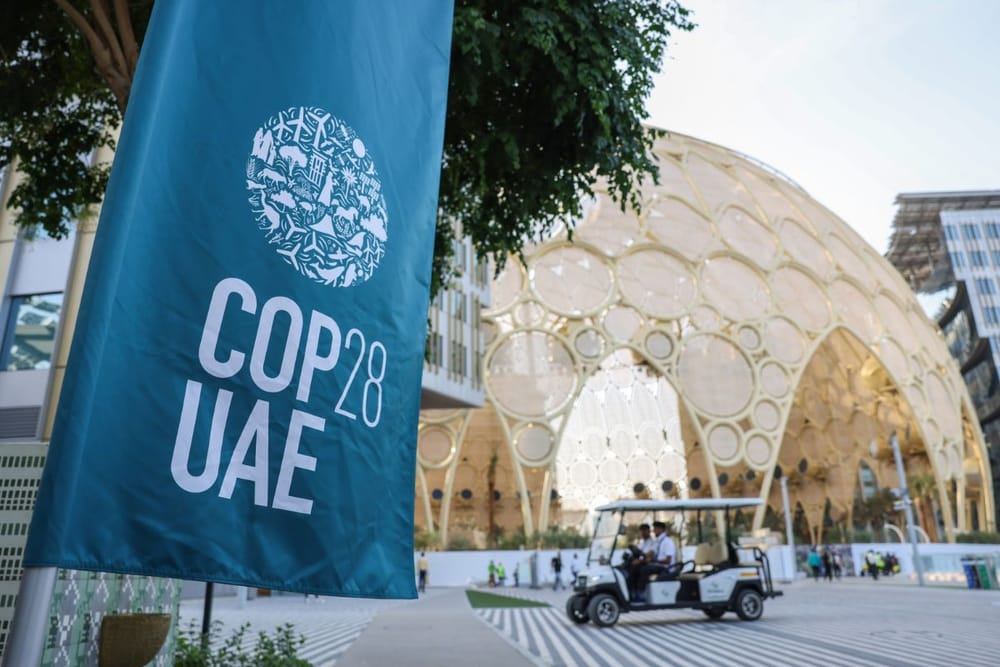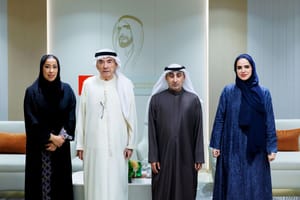Today, COP28 concluded with a historic agreement by 198 Parties to deliver a new era of climate action.
Today, the Parties agreed on a landmark text named "The UAE Consensus", which sets out an ambitious climate agenda to keep 1.5°C within reach. The UAE Consensus calls on Parties to transition away from fossil fuels to reach net zero, encourages them to submit economy-wide Nationally Determined Contributions (NDCs), includes a new specific target to triple renewables and double energy efficiency by 2030, and builds momentum towards a new architecture for climate finance.
The UAE Consensus, which follows a year of inclusive diplomatic engagements and two weeks of intense negotiations, reflects the COP28 Presidency's goal to provide the most ambitious response possible to the Global Stocktake and deliver on the central aims of the Paris Agreement.
"The world needed to find a new way. By following our North Star, we have found that path,"
said Dr. Sultan bin Ahmed Al Jaber, Minister of Industry and Advanced Technology and COP28 President, during his closing speech.
"We have worked very hard to secure a better future for our people and our planet. We should be proud of our historic achievement."
"I promised a different sort of COP. A COP that brought everyone together – private and public…civil society and faith leaders, youth and indigenous peoples. Everyone came together from day one. Everyone united, acted and delivered."
Throughout the COP28 process, Dr. Al Jaber and the COP28 Presidency team have expressed determination to deliver "a plan that is led by the science" and to define a new way for this and future COPs, based on the inclusion of diverse peoples and elevating the needs of the Global South.
"It is a balanced plan that tackles emissions, bridges the gap on adaptation, reimagines global finance and delivers on loss and damage,"
said Dr. Al Jaber.
"It is built on common ground. It is strengthened by inclusivity and it is reinforced by collaboration. It is an enhanced, balanced, but make no mistake, historic package to accelerate climate action."
Major commitments contained in the final negotiated text include:
• An unprecedented reference to transitioning away from all fossil fuels to enable the world to reach net zero by 2050.
• A significant step forward in the expectations for the next round of Nationally Determined Contributions (NDCs) by encouraging "economy-wide emission reduction targets."
• Building momentum behind the financial architecture reform agenda, recognising the role of credit rating agencies for the first time, and calling for a scale up of concessional and grant finance.
• A new, specific target to triple renewables and double energy efficiency by 2030
• Recognising the need to significantly scale up adaptation finance beyond the doubling to meet urgent and evolving needs.
Outside the Global Stocktake, COP28 delivered historic negotiated outcomes to operationalise Loss and Damage, securing $792 million of early pledges, providing a framework for the Global Goal on Adaptation (GGA), and institutionalising the role of the Youth Climate Champion to mainstream youth inclusion at future COPs.
Throughout 2023, the COP28 Presidency has taken bold and decisive steps to deliver beyond the negotiated text through its 'Action Agenda' which spans four pillars: fast tracking a just and orderly energy transition; fixing climate finance to make it more available, affordable, and accessible; focusing on people, nature, lives and livelihoods; and fostering full inclusivity in climate action.
The scale of achievements delivered under the Action Agenda has been unprecedented for any COP and is a testament to the willingness of representatives from a huge range of sectors and industries to take positive action.
Under the total Action Agenda at COP28, over $85 billion in funding has been mobilised, and 11 pledges and declarations have been launched and received historic support.
Major Action Agenda achievements, which sit apart from the negotiated text, include:
• The launch of ALTÉRRA, the UAE's $30 billion catalytic private finance vehicle, which seeks to mobilise a total of $250 billion for global climate action.
• The 'COP28 UAE Declaration on Agriculture, Food, Climate,' embedding sustainable agriculture and food systems in the response to climate change. It has received endorsements from 158 countries.
• The 'COP28 UAE Declaration on Climate and Health,' to accelerate the development of climate-resilient, sustainable and equitable health systems. It has been endorsed by 144 countries.
• The Global Decarbonisation Accelerator (GDA) – a series of landmark energy initiatives across the public and private sectors to speed up the energy transition.
• The Global Renewables and Energy Efficiency Pledge to triple worldwide installed renewable energy generation capacity to at least 11,000 gigawatts and to double the global average annual rate of energy efficiency improvements to more than 4 percent by 2030. It has been endorsed by 132 countries.
• The Oil and Gas Decarbonisation Charter (OGDC), which commits signatories to zero methane emissions and ending routine flaring by 2030, and to net-zero operations by 2050 at the latest. To date, 52 companies, representing over 40 percent of global oil production have signed up to it.
• The 'Coalition for High Ambition Multilevel Partnerships (CHAMP) Pledge' aims to advance the integration of sub-national leaders in climate-related decision-making, which has been endorsed by 67 countries.
• The COP28 Presidency's receipt of the Global Youth Statement: the collective climate policy demands of children and youth from over 160 countries worldwide
Its delivery follows a year of youth engagements championed by Shamma Al Mazrui, the first official Youth Climate Champion.
The COP28 Presidency has been clear in its intention to ensure that the agreements made at COP28 are delivered and followed through to COP29 and COP30, with mechanisms to track progress against implementation. Already, the Presidency has signed an agreement with Brazil, the host country of COP30, to deepen collaboration and increase climate ambitions by COP30.
Central to the agreement with Brazil will be working with Azerbaijan, the hosts of COP29, to ensure Parties come to COP30 with ambitious updated climate plans for action in this critical decade, as well as whole-of-economy NDCs building on the momentum generated at COP28.
News Source: Emirates News Agency









